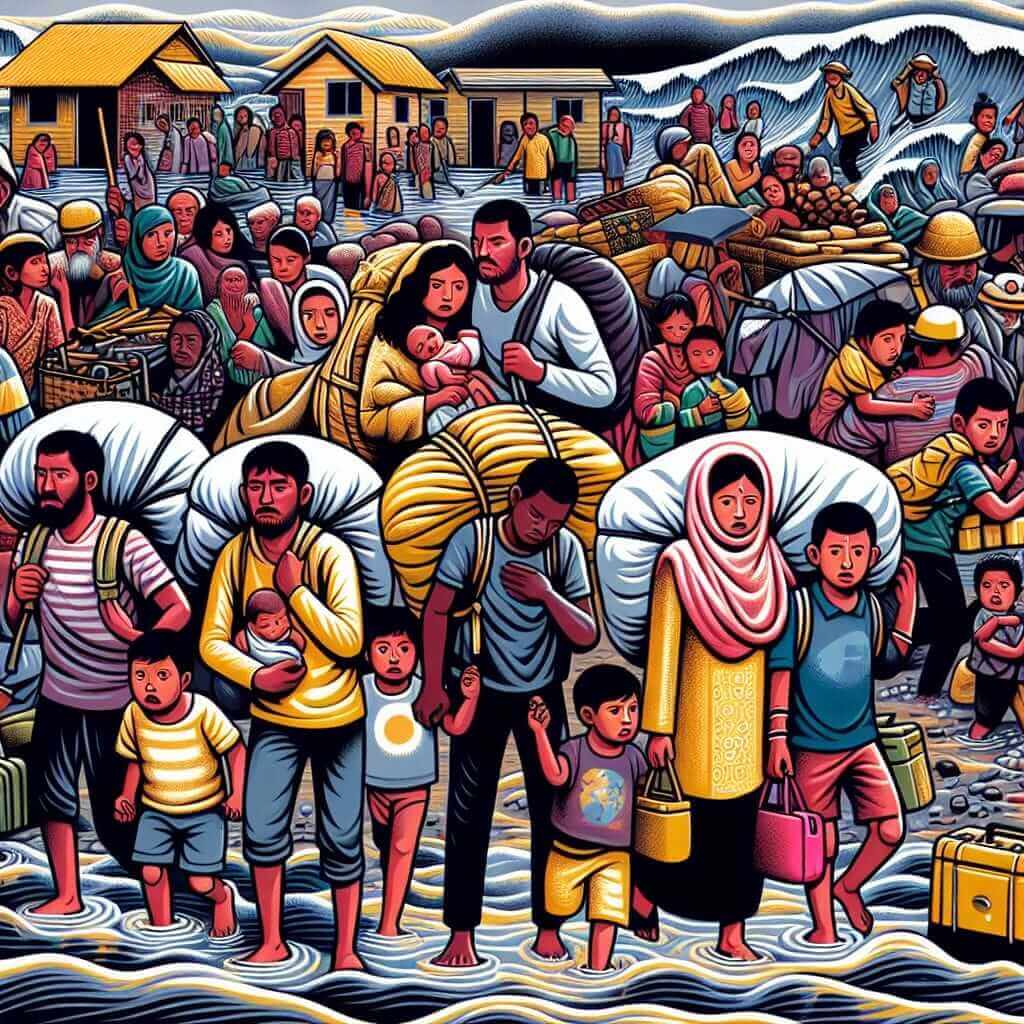The IELTS Reading section requires candidates to read passages and answer questions that test their understanding and analytical skills. One highly relevant and current topic that often appears in IELTS Reading is the impact of climate change on global migration. Given the increasing frequency and severity of climate-related events, understanding this topic is not only essential for the IELTS exam but also for comprehending global issues.
This article will delve into “What are the challenges of managing global migration due to climate change?” We will provide a comprehensive IELTS Reading practice exercise based on this topic, complete with questions and answers to help you prepare effectively.
IELTS Reading Practice on Climate Change and Migration
Reading Passage
The following passage falls into the Medium Text category.
The Challenges of Managing Global Migration Due to Climate Change
Climate change has become a predominant factor influencing migration patterns worldwide. Several regions are becoming increasingly uninhabitable due to extreme weather events such as hurricanes, floods, and prolonged droughts. These environmental changes are forcing people to leave their homes in search of safer and more stable living conditions.
<
One major challenge in managing global migration due to climate change is the lack of international legal frameworks. Currently, there is no specific legal status for climate migrants, which leads to a lack of protection and support. Traditional categories of refugees and migrants do not adequately cover those displaced by climate factors, leaving a significant gap in international policy.
Furthermore, the economic implications are substantial. Host countries often struggle to integrate large influxes of migrants, which can strain public services and lead to social tensions. Developing nations, in particular, may lack the resources needed to provide adequate support to incoming populations.
Social and cultural challenges also arise as climate migrants may face discrimination and xenophobia in host communities. This can hinder their ability to integrate and access essential services, thereby exacerbating their vulnerability.
Lastly, the environmental degradation in the regions left behind can lead to further instability. Depleted resources and degraded land can trigger conflicts over remaining assets, creating additional security concerns.
In conclusion, managing global migration due to climate change requires a multifaceted approach, encompassing legal, economic, social, and environmental strategies. It is imperative for international bodies to establish comprehensive frameworks to address these challenges and support both migrants and host communities.
Questions
-
Multiple Choice
- According to the passage, what is a major legal challenge in managing global migration due to climate change?
- A) Lack of international legal frameworks
- B) Economic difficulties in host countries
- C) Social and cultural discrimination
- D) Environmental degradation
- According to the passage, what is a major legal challenge in managing global migration due to climate change?
-
True/False/Not Given
- The passage states that climate migrants receive the same legal status as traditional refugees.
-
Matching Information
- Match the following statements with the correct paragraphs in the passage.
- i. The economic challenges faced by host countries
- ii. Social and cultural issues experienced by climate migrants
- Match the following statements with the correct paragraphs in the passage.
-
Summary Completion
- Complete the following summary using words from the passage:
- Climate change is influencing migration patterns due to extreme weather events that make certain regions ____. A significant challenge is the absence of ____ to protect climate migrants. Economically, host countries may find it difficult to ____ a large number of migrants, while social issues like ____ can further complicate integration.
- Complete the following summary using words from the passage:
Answer Key and Explanations
-
Multiple Choice:
- Answer: A) Lack of international legal frameworks
- Explanation: Paragraph 2 explicitly mentions the absence of a specific legal status for climate migrants, which leads to insufficient protection.
-
True/False/Not Given:
- Answer: False
- Explanation: The passage indicates that traditional categories of refugees and migrants do not cover those displaced by climate factors.
-
Matching Information:
- Answer:
- i. Paragraph 3 (The economic challenges faced by host countries)
- ii. Paragraph 4 (Social and cultural issues experienced by climate migrants)
- Explanation: Paragraph 3 discusses economic difficulties, while Paragraph 4 focuses on social and cultural challenges.
- Answer:
-
Summary Completion:
- Answers: uninhabitable, international legal frameworks, integrate, discrimination
- Explanation: These words summarize the main points discussed regarding climate change’s influence on migration patterns and the associated challenges.
Common Mistakes and Tips
- Misidentifying Key Points: Ensure you understand the main ideas of each paragraph before answering.
- Vocabulary Confusion: Pay attention to specific terms relevant to the passage.
- Time Management: Practice reading quickly yet effectively to manage your time during the exam.
Vocabulary List
Here are some useful vocabularies from the passage:
- Predominant (adj.) [prɪˈdɒmɪnənt]: Most common or influential.
- Uninhabitable (adj.) [ˌʌnɪnˈhæbɪtəbl̩]: Not suitable for living.
- Framework (n.) [ˈfreɪmwɜːk]: A structured plan or set of rules.
- Xenophobia (n.) [ˌzɛnəˈfəʊbiə]: The fear or hatred of foreigners.
- Integration (n.) [ˌɪntɪˈɡreɪʃən]: The process of becoming part of a different society or culture.
Grammar Focus
-
Subjunctive Mood:
- Used to express wishes, demands, or suggestions.
- Example: “It is imperative that international bodies establish comprehensive frameworks.”
-
Relative Clauses:
- Provides additional information about a noun.
- Example: “Currently, there is no specific legal status which can adequately protect climate migrants.”
Conclusion
Understanding the challenges of managing global migration due to climate change is crucial both for the IELTS Reading exam and global awareness. Through practice, focusing on key vocabulary, and mastering relevant grammar structures, you can improve your reading skills and score higher in the IELTS exam. Keep practicing, stay informed, and you will succeed.
For additional insights on similar topics, you can refer to The Consequences of Climate Change for Developing Nations and The Implications of Climate Change on Global Security.